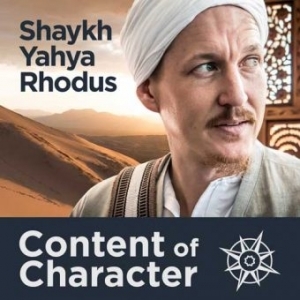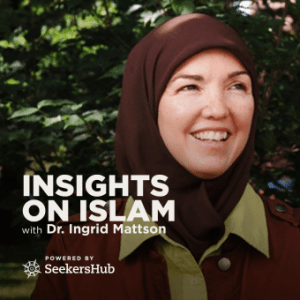SeekersGuidance’s Top 5 Podcasts of 2017
What a year for our podcasts. SeekersGuidance’s scholars and teachers made a wide array of topics on Islam fresh and relevant, discussing everything from getting along with neighbors and improving personal interactions to community engagement and setting new leadership standards.
All of these high-quality recordings and more are powered by SeekersGuidance and available on iTunes, Android, and other platforms. 2017 was all about providing you with every means of beneficial Islamic knowledge for free, and 2018 will bring you so much more insha’llah.
Check out the top five podcasts from 2017:
1. The Content of Character by Shaykh Yahya Rhodus
Featured Episode: “Directing Others to Good“
Shaykh Yahya explains what it means for the one who points to good is as the one who did it. It is from the bounty of Allah that one gets rewarded without actually acting on the deed. He also clarifies the distinction between worldly good and good in the hereafter, and calls us to be people of good who bring about benefit to our societies and wherever we may be.
“If people around us, even if they disagree with us, saw us as being beneficial to their societies, and we’re trying to bring about khayr at every single level, in the worldly and the religious sense, […] they will respect us. And this will be the greatest way for us to be able to point others to this great good that lies in the teachings of our Prophet (peaceful prayers and blessings be upon him).”
2. The Rawha by Shaykh Faraz Rabbani
Featured Episode: “Loving the Prophet ﷺ and Loving Good for Others from the Qualities of Faith”
 In this episode, Shaykh Faraz Rabbani covers hadith seven and eight from Imam Nabahani’s eighth set of hadiths on the virtues of loving for the sake of Allah and hating for the sake of Allah. In the seventh hadith, we learn about how loving for others what one loves for themselves is from the qualities of faith. In the eighth hadith, we learn about how loving the Prophet (peaceful prayers and blessings be upon him) more than ourselves is also from the qualities of faith.
In this episode, Shaykh Faraz Rabbani covers hadith seven and eight from Imam Nabahani’s eighth set of hadiths on the virtues of loving for the sake of Allah and hating for the sake of Allah. In the seventh hadith, we learn about how loving for others what one loves for themselves is from the qualities of faith. In the eighth hadith, we learn about how loving the Prophet (peaceful prayers and blessings be upon him) more than ourselves is also from the qualities of faith.
“The great commentators of hadith, including Imam al-Nawawi and Imam al-Qurtubi, said that the brotherhood (ukhuwwa) mentioned [in this hadith] is the brotherhood of humanity. And there are other narrations similar to this one in which the Prophet (peaceful prayers and blessings be upon him) said explicitly that “one loves for people what one loves for themselves”. A brother (akh) is someone with which you have a common ascription, such as through family, faith, country or humanity. So the ulama’ say that this hadith means that one loves for all other people… because you want good for them in this life and in the hereafter.”
3. Insights on Islam by Dr. Ingrid Mattson
Featured Episode: “Civic Engagement and Concern: Muslims as Torchbearers”
Dr. Mattson discussed submitting to the will of Allah and reminding us that our religion is the main lens by which we should view our relationships with our communities and the bodies that govern them.
“One of the things I see in both [Canada and the United States] is the idea of conservative politics. And I do not mean any particular political party, but the idea of [conservation]. Sometimes I feel deceived in a way and distracted by certain words from politicians in our society. As Muslims, we think “Oh, I’m conservative as a Muslim. I’m conservative in terms of sexual mores or things like that. But what are [politicians] talking about in terms of conservation? Are they talking about conservation of the goals of Shari’a? Are they conserving religion?”
4. Why Islam is True by Shaykh Hamza Karamali
Featured Episode: “God Exists”
If Islam is true, then it would make sense for Allah to have communicated evidence of His existence to us. In fact, He did. In this episode, Shaykh Karamali unpacks a key Qur’anic verse that argues that the contingency of the universe is evidence that God exists.
“This fact shows us that the Universe’s existence is a contingent fact. Why is it a contingent fact? Because even though the Universe exists, it could have been otherwise and not exist.”
5. Islam For Life by Shaykh Walead Mosaad
Featured Episode: “Giving Life to Surah Kahf “
 Shaykh Walead Mosaad gives a concise overview of some meanings and themes found in Surah al-Kahf. In Surah Kahf there are lessons and parables that contain guidance on how to deal with the trials and tribulations that are associated with the Dajjal, and to try to see things as they truly are and to beware of delusion.
Shaykh Walead Mosaad gives a concise overview of some meanings and themes found in Surah al-Kahf. In Surah Kahf there are lessons and parables that contain guidance on how to deal with the trials and tribulations that are associated with the Dajjal, and to try to see things as they truly are and to beware of delusion.
“In order to realize your humanity, you have to lessen your dependence, reliance and aggrandizing of your terrestrial body, [or] the things that are only known by senses (‘alam al-hissi). And these are some of the lessons of Surah al-Kahf. For example, Khidr (peace be upon him) does things in front of Moses that are reprehensible from the outward signs, such as killing the young boy, re-building the wall for the town that didn’t want to feed them, putting a hole in a sound boat… it [didn’t] seem right fro the outward aspect (shari’a). But from the inward aspect (haqiqa), neither of which contradict the other and [rather] compliment one another, if we go by the outward edifices of everything in life, then you will not know life.”
Help SeekersGuidance continue to provide millions with free and open access to Islamic education!
We don’t believe in charging for sacred knowledge. That’s why all our services are provided 100% free of charge. This is made possible by a small group of generous donors. For as little as $10/month, you can help millions around the world access transformative Islamic knowledge, free of charge.



